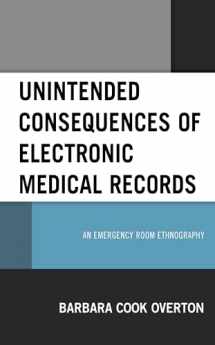
Unintended Consequences of Electronic Medical Records: An Emergency Room Ethnography
Book details
Summary
Description
Unintended Consequences of Electronic Medical Records: An Emergency Room Ethnography argues that while electronic medical records (EMRs) were supposed to improve health care delivery, EMRs’ unintended consequences have affected emergency medicine providers and patients in alarming ways. Higher healthcare costs, decreased physician productivity, increased provider burnout, lower levels of patient satisfaction, and more medical mistakes are just a few of the consequences Barbara Cook Overton observes while studying one emergency room’s EMR adoption. With data collected over six years, Overton demonstrates how EMRs harm health care organizations and thrust providers into the midst of incompatible rule systems without appropriate strategies for coping with these challenges, thus robbing them of agency. Using structuration theory and its derivatives to frame her analysis, Overton explores the ways providers communicatively and performatively receive and manage EMRs in emergency rooms. Scholars of communication and medicine will find this book particularly useful.


We would LOVE it if you could help us and other readers by reviewing the book
Book review



